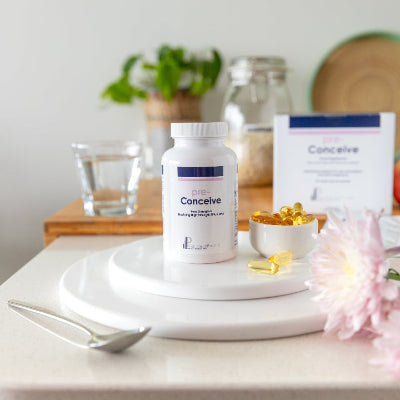While fertility discussions often focus on women, science tells us that male reproductive health contributes equally to conception success. Around 40–50% of infertility cases involve male factors, primarily related to sperm quantity, quality, and function.
Sperm health depends not only on genetics but also on lifestyle and nutrition. Since sperm take about 74 to 90 days to mature, dietary and lifestyle interventions in the three months before conception can significantly improve sperm parameters and reproductive outcomes.
Understanding Sperm Health
Healthy sperm are characterised by:
- Count (concentration): the number of sperm per millilitre of semen.
- Motility: the ability to swim effectively toward the egg.
- Morphology: the shape and structure of the sperm.
- DNA integrity: the stability of genetic material within sperm cells.
All these factors are highly sensitive to oxidative stress, nutrient deficiencies, and environmental toxins. Hence, targeted nutrition can be one of the most effective ways to enhance male fertility.
Key Nutrients That Support Male Fertility
Zinc
- Role: Critical for testosterone production, sperm motility, and chromatin stability. Zinc deficiency has been linked to reduced sperm count and poor morphology.
- Sources: Oysters, red meat, pumpkin seeds, legumes, nuts.
- Recommended intake: 20+mg/day for men.
- Scientific note: Zinc acts as a cofactor for enzymes involved in spermatogenesis and antioxidant defence (superoxide dismutase).
Selenium
- Role: Integral to selenoproteins that protect sperm from oxidative damage and are vital for sperm tail formation.
- Sources: Brazil nuts, fish, eggs, whole grains.
- Recommended intake: 200µg/day for subertile men.
- Evidence: A 2018 meta-analysis found that selenium supplementation improved sperm motility and morphology in men with infertility.
Vitamin C
- Role: A potent antioxidant that reduces oxidative DNA damage in sperm.
- Sources: Citrus fruits, berries, bell peppers, kiwi.
- Recommended intake: 500–1,000 mg/day.
- Research highlight: Men taking vitamin C and E showed a significant improvement in sperm motility and reduced DNA fragmentation.
Vitamin E
- Role: Protects sperm cell membranes from lipid peroxidation caused by reactive oxygen species (ROS).
- Sources: Almonds, sunflower seeds, spinach, avocado.
- Typical dose for fertility: 200 - 400 IU/day.
- Synergy: Works synergistically with vitamin C and selenium for optimal antioxidant defence.
Coenzyme Q10 (CoQ10)
- Role: An antioxidant and energy cofactor within mitochondria, supporting sperm motility and function.
- Sources: Fatty fish, organ meats, whole grains, and supplements.
- Dosage: 100–300 mg/day in studies.
- Evidence: Randomised trials show that CoQ10 supplementation increases sperm concentration and motility after 3–6 months.
Omega-3 Fatty Acids (DHA and EPA)
- Role: Improve sperm membrane fluidity, motility, and morphology. DHA is essential for the structure of the sperm tail and acrosome (the cap that enables egg penetration).
- Sources: Fatty fish (salmon, sardines), flaxseed, chia, walnuts, algae oil.
- Recommendation: 500–1,000 mg DHA+EPA daily.
- Scientific link: Low seminal DHA levels are correlated with reduced sperm count and abnormal morphology.
Folate and Vitamin B12
- Role: Support DNA synthesis, methylation, and sperm chromatin integrity.
- Sources: Leafy greens, legumes, eggs, fish, meat.
- Recommendation: Folate (400 µg/day), B12 (20+µg/day).
- Research note: Deficiency in either nutrient can lead to sperm aneuploidy (chromosomal abnormalities).
L-Carnitine
- Role: Transports fatty acids into mitochondria for energy production, essential for sperm motility.
- Sources: Red meat, dairy, some supplements.
- Dosage: 1,000–3,000 mg/day in clinical studies.
- Evidence: Supplementation improves sperm motility and total motile sperm count, particularly in idiopathic infertility.
Oxidative Stress and Antioxidants
Sperm are uniquely vulnerable to oxidative stress because their plasma membranes are rich in polyunsaturated fatty acids and have limited cytoplasmic antioxidant enzymes.
High levels of ROS, from smoking, poor diet, or pollution, can damage sperm DNA, leading to reduced fertility or increased miscarriage risk.
Antioxidant nutrients (vitamin C, E, selenium, CoQ10, zinc) neutralise ROS, preserving sperm DNA integrity and motility.
Lifestyle Factors That Enhance Nutrient Effects
Nutrition doesn’t act in isolation. To maximise fertility benefits:
- Maintain a healthy weight: Obesity disrupts testosterone and increases oxidative stress.
- Avoid smoking and excessive alcohol: Both increase DNA fragmentation and reduce motility.
- Exercise moderately: Regular activity improves hormonal balance, but excessive training can lower testosterone.
- Reduce stress: Chronic stress elevates cortisol, which suppresses reproductive hormones.
Supplementation: When and How
While a balanced diet is the foundation, targeted supplementation can help men with suboptimal sperm parameters or nutrient deficiencies.
Combinations of antioxidants — such as vitamin C + E + CoQ10 + zinc — have shown synergistic benefits in improving sperm quality.
Don’t forget to check out our own study results, here.
Conclusion
Male fertility is deeply influenced by micronutrient and antioxidant status. The right nutritional support can improve sperm count, motility, and morphology, increasing the chances of conception and the health of future offspring.
Just as maternal nutrition shapes early development, paternal nutrition shapes the genetic and epigenetic blueprint of life. Investing in nutrient-rich eating and healthy habits before conception is, quite literally, an investment in the next generation.






